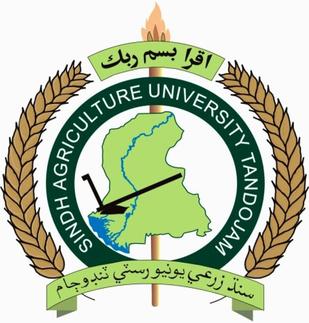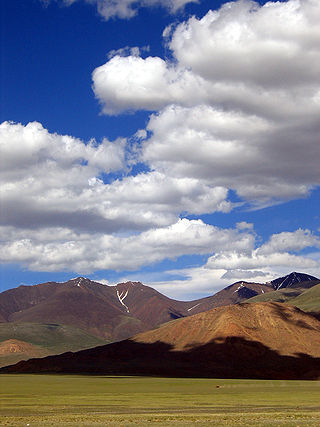
Animal husbandry is the branch of agriculture concerned with animals that are raised for meat, fibre, milk, or other products. It includes day-to-day care, selective breeding, and the raising of livestock. Husbandry has a long history, starting with the Neolithic Revolution when animals were first domesticated, from around 13,000 BC onwards, predating farming of the first crops. By the time of early civilisations such as ancient Egypt, cattle, sheep, goats, and pigs were being raised on farms.

Sheep farming or sheep husbandry is the raising and breeding of domestic sheep. It is a branch of animal husbandry. Sheep are raised principally for their meat, milk, and fiber (wool). They also yield sheepskin and parchment.
The Faculty of Agriculture at Dalhousie University is a Canadian agricultural college and faculty of Dalhousie University located in Bible Hill, Nova Scotia. The Faculty of Agriculture offers the only university level programs in agriculture in Atlantic Canada. Founded 14 February 1905 as the Nova Scotia Agricultural College within the Nova Scotia Department of Agriculture, it merged with Dalhousie University on 1 September 2012. The campus is referred to as Dalhousie University's "Agricultural Campus" or by its popular sports nickname of "Dal AC" or simply the "AC."

Animal science is described as "studying the biology of animals that are under the control of humankind". It can also be described as the production and management of farm animals. Historically, the degree was called animal husbandry and the animals studied were livestock species, like cattle, sheep, pigs, poultry, and horses. Today, courses available look at a broader area, including companion animals, like dogs and cats, and many exotic species. Degrees in Animal Science are offered at a number of colleges and universities. Animal science degrees are often offered at land-grant universities, which will often have on-campus farms to give students hands-on experience with livestock animals.

Clinterty Agricultural College was a small further education college near Aberdeen in Scotland, which became part of Aberdeen College.

Sindh Agriculture University, is situated in Tando Jam town of Hyderabad, on Hyderabad-Mirpurkhas highway and is about 200 km (120 mi) from Karachi airport linked with super highway to Hyderabad.

Assam Agricultural University (AAU) is an agricultural education state university which was established on 1 April 1969 in Jorhat in the state of Assam, India. The jurisdiction of the university extends to the entire State of Assam with regard to teaching, research and extension education in the field of agriculture and allied sciences. The university has a number of campuses with its headquarters at Borbheta, Jorhat.

The University of Veterinary and Animal Sciences, or UVAS originally known as Lahore Veterinary College, is a public university located in Lahore, Punjab, Pakistan.

Agriculture in Mongolia constitutes over 10% of Mongolia's annual gross domestic product and employs one-third of the labor force. However, the high altitude, extreme fluctuation in temperature, long winters, and low precipitation provides limited potential for agricultural development. The growing season is only 95 – 110 days. Because of Mongolia's harsh climate, it is unsuited to most cultivation.

Intensive animal farming, industrial livestock production, and macro-farms, also known by opponents as factory farming, is a type of intensive agriculture, specifically an approach to animal husbandry designed to maximize production, while minimizing costs. To achieve this, agribusinesses keep livestock such as cattle, poultry, and fish at high stocking densities, at large scale, and using modern machinery, biotechnology, and global trade. The main products of this industry are meat, milk and eggs for human consumption. There are issues regarding whether intensive animal farming is sustainable in the social long-run given its costs in resources. Analysts also raise issues about its ethics.

Sokoine University of Agriculture (SUA) is a public university in Morogoro, Tanzania, specializing in agriculture. The university is named after the country's second prime minister Edward Sokoine.
The College of Agriculture and Renewable Natural Resources (CANR) is one of the six colleges of Kwame Nkrumah University of Science and Technology in Ghana.

The Tarlac Agricultural University (TAU), formerly the Tarlac College of Agriculture, is a public university in the province of Tarlac, Philippines. It is mandated to provide professional, technical and instruction for special purposes and to promote research extension services and progressive leadership in agriculture, agricultural education, home technology and other related fields. Its main campus is located in Malacampa, Camiling, Tarlac.

Livestock are the domesticated animals raised in an agricultural setting in order to provide labour and produce diversified products for consumption such as meat, eggs, milk, fur, leather, and wool. The term is sometimes used to refer solely to animals who are raised for consumption, and sometimes used to refer solely to farmed ruminants, such as cattle, sheep, goats, and pigs. Horses are considered livestock in the United States. The USDA classifies pork, veal, beef, and lamb (mutton) as livestock, and all livestock as red meat. Poultry and fish are not included in the category. The latter is likely due to the fact that fish products are not governed by the USDA, but by the FDA.
Federal College of Animal Health and Production Technology, Vom is one of the Federal Colleges of Agriculture in Nigeria. It is located within The National Veterinary Research Institute (NVRI), Vom, Jos South LGA, Plateau State, Nigeria. It is saddle with training of middle level manpower in Animal Health, Animal Production, Livestock Extension/ Management Services and Vocational Training who could effectively utilize their training to establish and manage livestock farms.nt

Mitraniketan Vishwavidyapeetam for Open Learning & Total Development is a Non-Governmental organization located at Vellanad, which is 25 km away from Thiruvananthapuram, the capital of Kerala state in South India. It is a 500-member community, including a staff of 100 men and women. Mitraniketan works in the fields of innovation, training and extension in community development, environment, science, education and appropriate technology. The project was begun with a view to offering education and training in a holistic spirit to primarily socially underprivileged children and youngsters. The organization focuses on alternative education mode for development.

Vietnam National University of Agriculture, until 2014 Hanoi University of Agriculture (HUA), is an education and research university specializing in the agricultural sector. The university is located in Trau Quy town, Gia Lam district, a Hanoi suburban area, about 12 km far from Hanoi city centre.
Gordon Lee McClymont AO was an Australian agricultural scientist, ecologist, and educationist. The originator of the term "sustainable agriculture", McClymont is known for his multidisciplinary approach to farm ecology. McClymont was the foundation chair of the Faculty of Rural Science at the University of New England, the first degree program of its kind to integrate animal husbandry, veterinary science, agronomy, and other disciplines into the field of livestock and agricultural production. In 1978, in recognition of his work and contributions to his field, he was appointed Officer of the Order of Australia.

The Lilongwe University of Agriculture and Natural Resources (LUANAR) is a university outside Lilongwe, Malawi. It was formed in 2011 by a merger between Bunda College of Agriculture of the University of Malawi and Natural Resources College (NRC).












